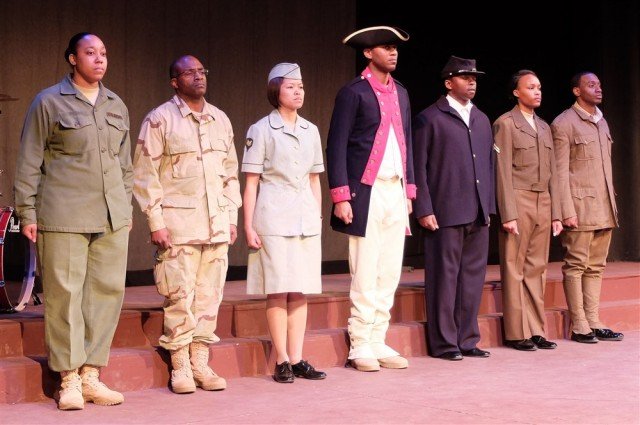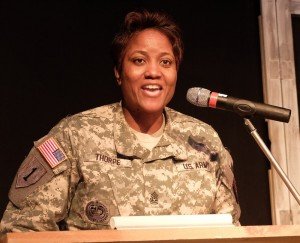
Story and photos by
United States Africa Command Office of Public Affairs
“A Century of Black Life, History, and Culture” was the theme for this year’s Black History Month celebration in a joint venture sponsored by the U.S. Army Garrison Stuttgart and U.S. Africa Command, Feb. 26, at the theater on Kelley Barracks, U.S. Army Garrison in Stuttgart, Germany.
Lead event planner and organizer was Chief Warrant Officer Vickie Slade, who works in AFRICOM’s legal office. “It’s impossible to highlight all the accomplishments of African Americans over the past 100 years in just 90 minutes,” exclaimed Slade, “so this year’s program focused on achievements made in theater, fraternities and sororities, gospel music and the U.S. military.”
“When I think about Black History Month, I think about three things – relevance, reiteration and reality,” said Garrison Command Sergeant Major Lynice Thorpe.
“The struggles of the past make today’s challenges relevant,” said Thorpe. “We must reiterate those battles to the younger generations because in today’s reality, as seen in stories from Ferguson to Paris, where a black French man was prevented from boarding a train because of negative taunts by rowdy soccer fans proclaiming, ‘We’re racist,’ shows we still have a way to go to achieve equality,” said Thorpe.

AFRICOM’s Chief of Staff, U.S. Air Force Maj. Gen. Michael Kingsley thanked the many participants for the work and time committed in creating a successful Black History Month program.
“It’s so important to take time to reflect on this history,” said Kingsley. “African American achievements are key to who we are as a nation.”
Stories through music and dance
Music and dance have always been fundamental to the story-telling of African American history.
A lively performance of “Juba Dance” was presented by the cast of “Her Stories,” a play on stage this month at the Stuttgart Theater on Kelley Barracks. The play was written and directed by Tonya Holloway, a playwright, lyricist, costume designer and director who introduced the excerpt from the play.
We’re having church!
Gospel music has its roots in the African American oral tradition of telling stories. No re-telling of Black History is complete without experiencing it.
The Patch High School Choir obliged by performing several songs, among them, a rousing rendition called, “Ain’t Judgin’ No Man.”
The Stuttgart Gospel Service Choir followed by singing songs of praise to God that had the audience clapping their hands and tapping their feet. And the music reached all the way to the back pews – or row of seats, in this case.
It’s academic – The Divine Nine
Something you don’t usually hear about in commemorations and celebrations of Black History Month is the role of collegiate fraternities and sororities.
Nine historically Black Greek Letter Organizations (BGLOs), referred to as “The Divine Nine” were represented by several local sorority sisters and fraternity brothers, each of whom spoke briefly about their BGLO.
Attending the event was a member of Alpha Phi Alpha fraternity. “What makes joining most valuable is the connection to our country’s history,” said Steven Carter, who serves with AFRICOM’s Office of Protocol, “and the impact you can make on its future.”
African Americans in military history
A parade of military personnel in uniforms dating back to the American Revolution showcased the contributions of African Americans who fought and sacrificed their lives in defense of freedom at home and abroad.
Tracy Smith, a fourth grade teacher at Sembach Grade School, drove two hours from Kaiserslautern to attend the Black History Month program in Stuttgart.
“I’m here in support of my sorority sister, Angela Hunter, who spoke during the program about Alpha Kappa Alpha,” said Smith. “I know all about the Divine Nine, but until today, I never really knew about the role African Americans have played in our military’s history!”
It’s not a celebration without food
You just had to be there to know that no matter how many times you’ve had ribs, chicken, greens and all the fixin’s , food has always been a centerpiece of not only the celebration of Black History Month, but is fundamental to African American culture as a way to come together.
Did you know?
You’ll want to Google Carter G. Woodson – he’s the man who conceived the idea that eventually evolved into Black History Month. His story is more than fascinating or good to know; it’s about courage and perseverance and the determination to keep on keeping on if you want to succeed. It’s a true story of a great American.
“In celebrating Black History Month, we do this to remind ourselves of where we’ve been,” concluded Slade. “Those struggles produced champions who pushed through – and now we can see how their accomplishments serve all people of all colors and cultures.”
